CHAKOTHI, Pakistan: Muhammad Latif never thought he would be washing buses for a living, but he took the job three years ago after shutting down the watermill that had been in his family for six decades.
Years of drought and erratic rains have devastated crops in his village of Chakothi, on the border of Pakistan-administered Kashmir, leaving locals with no grain to grind and no business for his mill, he said.
“When people stopped coming for grinding, I locked it up and started washing buses to buy bread for my family,” Latif, 50, told the Thomson Reuters Foundation, pointing at his deserted mill. “I am left with no option.”
Latif is among hundreds of millers who have had to abandon their trade as changing rain patterns shrink crop yields across the disputed Himalayan region, agricultural experts said.
Zahid Ahmed, business development officer with Pakistan’s National Rural Support Programme, estimated the region has more than 2,000 watermills.
But most have had to shut as harvests declined by 40 percent over the past decade, with only about 250 still functioning, he said.
Last year, incessant rains close to harvesting time caused huge crop losses all over Kashmir, said Murtaza Gillani, deputy director at the agriculture department for Jhelum valley, where Latif’s village is situated.’
“A farmer becomes dejected when his crop is lost near reaping, which forces him to switch to other jobs,” Gillani said, adding he once watched a farmer set fire to his entire field of failed crops in despair.
WHEAT PREFERENCE
Pakistan ranked fifth in last year’s Global Climate Risk Index published by environmental think-tank Germanwatch, which looks at countries suffering most from extreme weather events.
Those impacts, made worse by climate change, have had a knock-on effect on the hundreds of watermills, known locally as jandar, that were built decades ago along the brooks and streams of Kashmir, mainly for grinding wheat and maize, or corn.
Choudhary Muhammad Kareem, a farmer from Khaigaran village near Chakothi, remembers when there were a dozen watermills working along the brook near his farm — now only two are left.
Along with changing rain patterns, said Kareem, 65, shifting food habits are also putting a strain on watermills, with many young Kashmiris preferring wheat over corn.
As growing numbers of farmers swap from the hardy corn variety used in the region to wheat to meet demand, they lose more of their crops in dry spells or heavy rains, and watermills see less business, Kareem explained.
For farmers who are still managing decent yields, watermill closures force them to spend added time and expense to get their grain ground into flour.
“It costs me 2,000 Pakistani rupees ($13) if I rent a car to take wheat or maize for milling to the nearest town, which is 8 kilometers (5 miles) away from Chakothi,” Kareem said.
WATER SCARCITY
Agriculture experts estimate about 80 percent of farmland in Azad Kashmir Kashmir depends on rain for irrigation, but water shortages across Pakistan mean even those using irrigation systems often find their crops going thirsty.
Zaheer Gardezi, a water harvesting expert and former director of the national government’s rainwater harvesting project, said 70 years ago Pakistan’s annual per capita water availability topped 12,000 cubic meters.
Today, it has dropped to about 900 cubic meters per person per year, he said.
The United Nations defines a country as water stressed if annual availability falls below 1,700 cubic meters per person, and water scarce if it reaches 1,000 cubic meters.
With Kashmiri farmers struggling to grow enough to earn an income and feed their families, 3 million people are currently getting subsidised flour through a government program, said Sardar Amanullah Khan, director of the Kashmir food department.
Demand for subsidised flour — which is ground at industrial, electrically powered mills — jumped 30 percent after last year’s heavy rains, he added.
NEW MILL USES
The vicious cycle of extreme weather and ruined crops has put a strain on Kashmir’s watermills for years, said Muhammad Naeem Ahmed, director of the Office of Research, Innovation and Commercialization at the University of Azad Jammu and Kashmir and a farmer himself.
“Watermills are environmentally friendly and they are disappearing fast as frequent erratic rains and droughts are impacting farmers,” Ahmed said.
He suggested authorities look for new ways to adapt the mills to generate income, pointing to electricity generation and sawing logs for timber as examples.
Farmers also need to take adaptive measures, such as sowing hybrid crop varieties that can stand up better to severe weather, he said.
Muhammad Bashir Butt, secretary of Kashmir’s agriculture department, said the government is developing new climate-resilient seed varieties, as well as educating farmers on the benefits of adjusting planting times.
It is also reconstructing irrigation channels damaged by landslides, floods and the disastrous earthquake that struck the region in 2005, he said, noting the project could both benefit farmers and help revive shuttered mills.
Watermills could be set up over the canals and run on the water flowing through them, Butt told the Thomson Reuters Foundation.
But Latif, the mill owner in Chakothi, said even with a more reliable source of running water, he would still need government assistance to restore his mill after closing it for so long.
Made out of mud, wood and stone, the watermills start to fall apart without regular use and maintenance, he explained.
“I can restore this (mill) if the government or an NGO provides me with 50٫000 rupees,” he said.
“I do hope I will be able to restore my watermill soon, so I can try to save some money to buy food for my family.”
Watermills grind to a halt as erratic weather hits Kashmir grains
https://arab.news/vymw7
Watermills grind to a halt as erratic weather hits Kashmir grains
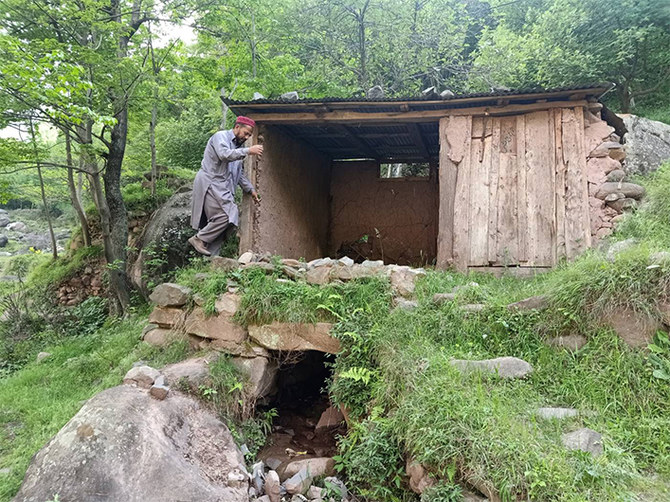
- Region has over 2,000 watermills, most have had to shut as harvests declined by 40% over past decade
- Shifting food habits are also affected watermills, with many young Kashmiris preferring wheat over corn
Security forces kill six militants in northwest Pakistan
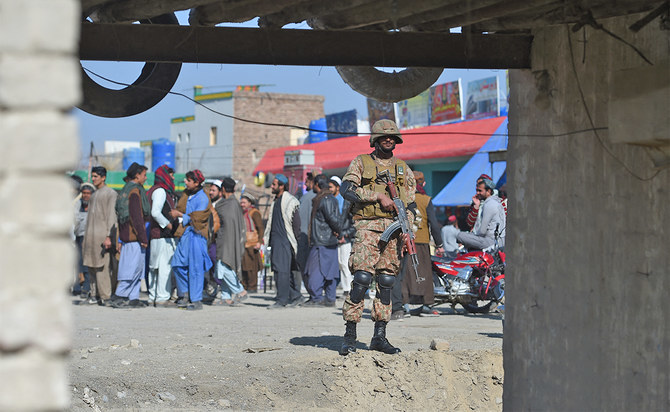
- The intelligence-based operation was carried out in North Waziristan that led to an intense exchange of fire
- The targeted militants were involved in violent attacks against security forces and civilians in the volatile area
ISLAMABAD: Pakistani security forces carried out an intelligence-based operation in North Waziristan tribal district in the early hours of Saturday, killing six militants after a heavy exchange of fire.
Located in the tribal belt along the Pakistan-Afghanistan border, North Waziristan has historically been known as a volatile region with significant militant activity.
The Pakistani military carried out several major operations in the area to dismantle militant networks and had success in reducing violence.
However, there have been reports of renewed militant activities in the region, prompting the Pakistani security forces to once again increase its focus on these challenges.
“On night 3/4 May 2024, security forces conducted an intelligence based operation in North Waziristan District, on reported presence of terrorists,” the military’s media wing, ISPR, said in a statement.
“During the conduct of operation, intense fire exchange took place between own troops and the terrorists,” it continued, adding that six militants were killed as a result.
The statement informed that the security forces also destroyed militant hideout during the operation and launched a “sanitization operation” in the area while trying to locate any remnants of the militant group.
“The killed terrorists remained actively involved in numerous terrorist activities against security forces as well as target killings of innocent civilians in the area,” the ISPR added.
Pakistan telecom authority seeks review of tax agency directive to block SIMs of non-filers
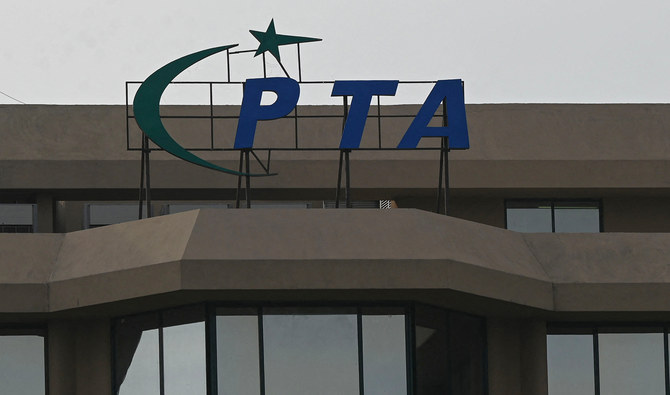
- Federal Board of Revenue issued a list of over half a million people who did not file tax returns in 2023
- Reports indicate that telecom companies showed reluctance to block the SIMs of so many subscribers
ISLAMABAD: The Pakistan Telecommunication Authority (PTA) on Saturday showed reluctance to implement the instructions of the country’s tax collection body to block the SIMs of non-filers, while asking the authority to review its decision.
The development came after the Federal Board of Revenue (FBR) issued a list of over half a million people who did not file income tax returns for 2023, instructing the PTA to block their cellphone SIMs as a penalty.
However, media reports indicated that telecom companies were reluctant to carry out the directives affecting so many subscribers, prompting an official meeting on Friday in which the government decided to act against anyone opposing FBR’s orders.
Still, the PTA circulated a brief notification on Saturday, seeking a review of the FBR’s decision.
“On the issue of blocking of mobile phone SIMs under section 114-B of Income Tax Ordinance, 2001, Pakistan Telecommunication Authority (PTA) has communicated to FBR that the Income Tax General Order (ITGO) in the manner as referred to the Authority needs review before its execution by the concerned entity/entities,” the notification said.
“In the meanwhile, PTA has also initiated consultation with stakeholders on the subject issue,” it added.
Pakistan has traditionally faced the challenge of convincing people to file their tax returns.
However, the government has decided now to implement stringent measures to address the problem, particularly in the context of negotiations for a new International Monetary Fund (IMF) program.
The IMF has frequently urged Pakistan to enhance its revenue collection from non-filers as part of broader economic reforms to support social and development initiatives.
In response, the FBR is taking steps like blocking the SIM cards of non-filers and considering other punitive measures to enforce tax compliance and widen the tax net.
Pakistan’s deputy PM, Saudi foreign minister discuss Muslim world issues at OIC summit
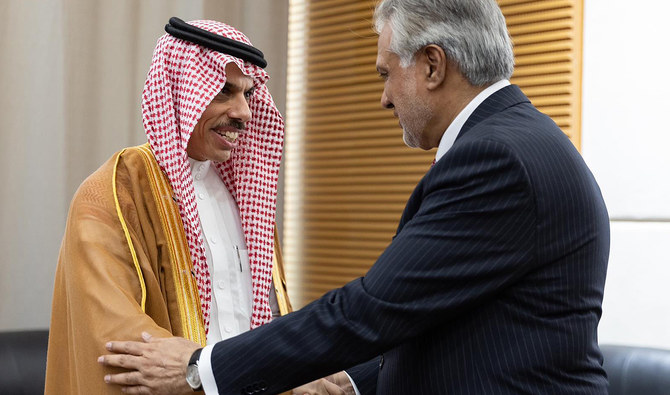
- Ishaq Dar stresses the significance of ceasefire in Gaza during his meetings with the Kuwaiti, Qatari and Egyptian FMs
- He also calls for more investment for his country and greater employment opportunities for Pakistanis in the Middle East
ISLAMABAD: Pakistan’s newly appointed Deputy Prime Minister Ishaq Dar met with Saudi Foreign Minister Prince Faisal bin Farhan and other Arab officials on the sidelines of the Organization of Islamic Cooperation (OIC) summit in Gambia on Saturday, emphasizing collective action to address the problems confronting the Muslim world.
The OIC summit is being held against a backdrop of widespread anger over Israel’s military actions in Gaza, which have resulted in the death of nearly 35,000 Palestinians along with a massive destruction of hospitals, schools and residential neighborhoods in the area.
There has been a clear uptick in Islamophobic sentiments and incidents in different parts of the world, particularly since the outset of the conflict last year in October.
The Pakistani deputy prime minister arrived in Gambia on Wednesday to present his country’s perspective on a wide range of issue, including the war in Gaza and the rights situation in the Indian-administered Kashmir.
“Deputy Prime Minister and Foreign Minister Mohammad Ishaq Dar @MIshaqDar50 today met Foreign Minister of Saudi Arabia H.R.H. Prince Faisal bin Farhan Al Saud @FaisalbinFarhan in Banjul, The Gambia,” the foreign office said in a social media post.
“They discussed strengthening strategic and economic relations between Pakistan and Saudi Arabia and enhancing economic cooperation and investment,” it continued. “They called for a ceasefire in Gaza and emphasized the importance of OIC’s role in addressing challenges concerning the Muslim Ummah including Islamophobia and the situations in Palestine and Kashmir.”
Dar also held separate meetings with the foreign ministers of Kuwait, Egypt and Qatar.
During his conversation with Abdullah Ali Al Yahya of Kuwait, he discussed the possibility of further strengthening bilateral cooperation.
He noted the government wanted to transform the “traditionally fraternal ties with Kuwait into a mutually beneficial economic partnership.”
Dar also discussed further consolidation in trade and investment with Qatar’s Sheikh Mohammed bin Abdulrahman Al Thani while seeking more employment opportunities for young Pakistanis.
He emphasized on an immediate ceasefire in Gaza during his interactions for all Arab officials, commending Egypt’s role in supporting international humanitarian assistance for Palestine in his meeting the Egyptian Foreign Minister Sameh Hassan Shoukry.
Pakistan Cricket Board reviews venue upgrades in meeting ahead of ICC Champions Trophy 2025
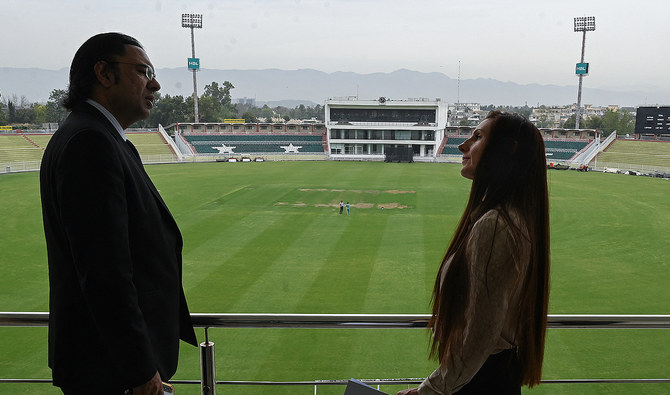
- PCB chairman says upgradation work has been delayed, asks authorities to hire international consultant
- It will be the first major international cricket tournament hosted solely by Pakistan since the 1996 World Cup
ISLAMABAD: The Pakistan Cricket Board (PCB) held a meeting at its headquarters in Lahore to review the upgradation plan for major cricket venues in the country on Saturday ahead of the two-week ICC Champions Trophy next year.
The meeting was presided over by the PCB chairman, Mohsin Naqvi, who directed the relevant officials to immediately hire international consultant to upgrade the Qaddafi Stadium Lahore, National Bank Stadium Karachi and Rawalpindi Stadium.
“The stadium upgradation work has already been delayed,” he observed during the meeting according an official PCB statement, instructing the authorities to speed up the process.
He also instructed to form a three-member committee to ensure the hiring process was carried out in keeping with the rules and regulations.
The PCB plans to provide world-class facilities at the three Pakistani cricket stadiums.
Its upgradation plan includes structural changes to the boxes along with improved facilities and numbered seats for spectators.
Additionally, the number of seats in the enclosures on both sides of the main gate of the Qaddafi Stadium will also be increased.
The PCB chairman directed the replacement of screens for scoreboards and live streaming, instructing the officials to prepare the feasibility to install new floodlights in the stadiums.
The ICC Champions Trophy is scheduled to take place in Pakistan from February to March 2025.
It is expected to be a significant event since it will mark the first major international cricket tournament hosted solely by Pakistan since the 1996 Cricket World Cup.
The tournament will include top-ranked One Day International (ODI) teams, with Pakistan having automatically qualified as the host nation.
‘No illegal Afghan nationals,’ seminary board declares as Pakistan’s Sindh plans crackdown
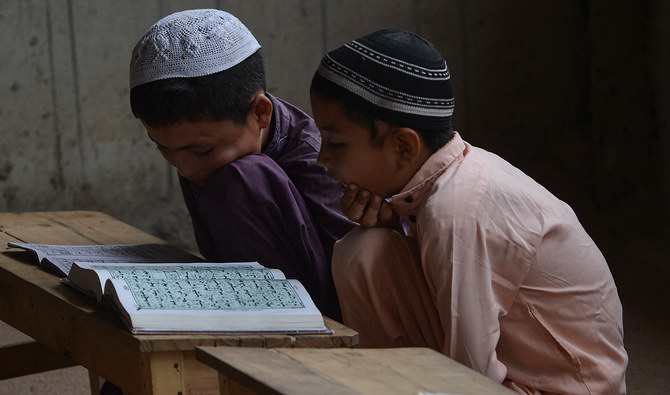
- The province took the decision after a security meeting was told a madrasah teacher was involved in 2023 KPO attack
- Independent analysts say Afghans involve in militant violence arrive from their country and are not residents of Pakistan
KARACHI: Pakistani seminaries have stopped giving admission to Afghan nationals except for those who approach them with the interior ministry’s approval, a top seminary board official informed Saturday, after the country’s southern Sindh province announced to deport illegally enrolled foreigners in seminaries and other educational institutions.
The decision was taken after the province’s apex committee, the top security forum, was briefed earlier this week that one of the individuals involved in the 2023 Karachi Police Office (KPO) attack was a madrasah or seminary teacher. It was also pointed out during the meeting that a number of unregistered foreigners were studying in such institutions in different parts of Sindh.
The 2023 attack was launched by militants, armed with guns and grenades, who stormed the building, leading to a prolonged gunfight with security forces. This confrontation resulted in casualties among both police officers and civilians, along with substantial damage to the police facility. The KPO attack was claimed by the banned militant network Tehreek-e-Taliban Pakistan (TTP), whose leadership is reportedly based in neighboring Afghanistan.
Speaking to Arab News, Maulana Talha Rehmani, spokesperson of Wafaq ul Madaris Al-Arabia Pakistan, said local seminaries had stopping enrolling Afghan nationals almost a year ago.
“Our madrasah used to offer admission to Afghan refugees who possessed proof of registration cards,” he said. “But that also stopped a year ago.”
“Different Pakistani intelligence agencies frequent seminaries for information,” he continued. “Nothing is hidden. The madrasas have a proper system of registration. We are ready to cooperate.”
Rehmani said the authorities had not shared any details with them about the identity of the seminary teacher involved in the KPO attack.
However, Dr. Aamir Tuaseen, former chairman of Pakistan Madrasah Education Board, noted seminaries lacked any coherent policy to develop “a monitoring system” for students.
“Admissions are granted to students without proper background checks,” he told Arab News. “The admission authorities also overlook which province or country does a student belong to, especially in case of Afghanistan.”
He added that boards of religious seminaries should take it upon themselves to grant admission only to students from the city where the seminary is located.
“This will help gather information about the background of every student,” he said, noting the current directorate of religious education did not seem to be fully functional.
The provincial information minister, Sharjeel Inaam Memon, did not respond to a request for comment, but a police official told Arab News on condition of anonymity the madrasah teacher involved in the KPO attack was a Pakistani national.
“The madrasah teacher was identified as Aryadullah who worked with a Karachi-based seminary,” the official said. “He was Pakistani citizen.”
Ihsanullah Tipu Mehsud, a security expert who manages an online publication, The Khorasan Diary, said the Afghan nationals involved in militant violence in Pakistan mostly arrived from the neighboring state and were not residents of Pakistan.
“The involvement of Afghan nationals in acts of terrorism cannot be ignored, but in my opinion, the government’s assertion is overstated,” he said. “The individuals involved in recent acts of terrorism are primarily those who have arrived directly from Afghanistan to carry out attacks rather than Afghan refugees.”
He emphasized any measures related to the expulsion of Afghan students from seminaries should not be driven by a reactionary approach.
“It is critical to implement gradual [seminary] reforms in accordance with the national action plan,” Mehsud said.










